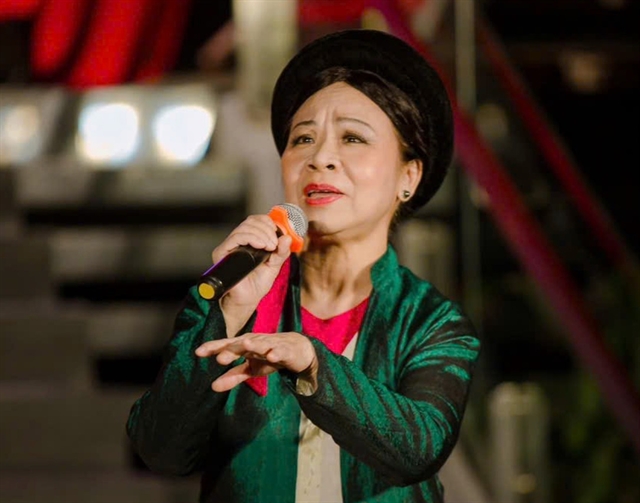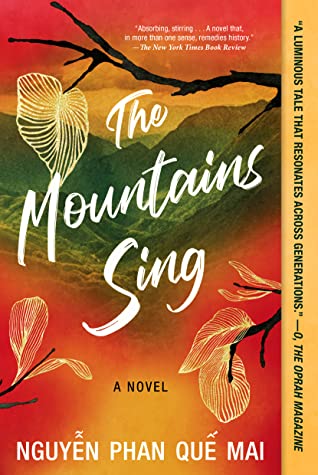 Inner Sanctum
Inner Sanctum

Nguyễn Phan Quế Mai is the only Vietnamese author to reach the 2021 finalist of Dayton Literary Peace Prize. Bảo Ngọc talks to her about the journey to this prestigious prize.
Nguyễn Phan Quế Mai is an award-winning Vietnamese writer and journalist. She is the author of eleven books of poetry, short fiction and non-fiction. Her debut novel The Mountains Sing is an international bestseller, and 2021 Fiction Runner-up of the Dayton Literary Peace Prize. Bảo Ngọc talks to her about the journey to this prestigious prize.
Inner Sanctum: Where does your writing inspiration come from?
When I was a child growing up in Bạc Liêu, a small rural town in southern Việt Nam, I loved to read.
I wanted to become a writer but due to circumstances of my family, I had to do all types of jobs to earn a living first.
I could only return to my childhood dream of being a writer when I was 33. I started writing poetry, then non-fiction, and fiction. The lives of ordinary Vietnamese people inspire me.
In my poetry, I have written about the street sellers of Hà Nội, the garbage collectors, the motorbike taxi drivers. In the lives of ordinary people, I see extraordinary things and valuable lessons that move me. My novel, The Mountains Sing, is about ordinary people who are tested by terrifying circumstances, and who not only survive, but live with compassion, and also pass on the torch of hope, of peace, and of human kindness to the next generations.
.jpg)
|
| Award winning author Nguyễn Phan Quế Mai. — Photo courtesy of the author |
Inner Sanctum: You won runner-up prize at the 2021 Dayton Literary Peace Prize. Can you share a little bit about your journey to this award?
Perhaps my book fits the criteria of the award, so I was lucky to win this year's runner-up. I am grateful to the Awards’ readers and judges who voted for my novel.
Every year, publishers in the US submit their selected works to the Award’s committee. The winners are chosen after rounds of consideration, and this year the short-list comprises of the many novels which are my recent favourite reads.
I feel very honoured to be included in their company and I am very excited about the award gala, to be taking place in Ohio on 13-14 November this year. I look forward to meeting last year and this year’s winners including many writers I have admired for many years: Margaret Atwood, Alice Hoffman, Chanel Miller, Alexander Starritt and more.
I am excited about the learning journey ahead of me and the opportunity to share more stories from Việt Nam with the international audience.
Inner Sanctum: You once said "it took me seven years to finish the book The Mountains Sing". So how did the writing process go?
I wrote The Mountains Sing as part of my Masters and PhD in Creative Writing with the UK’s Lancaster University.
My academic research is instrumental for my journey to become a novelist in English. It enabled me to gain a clearer vision from which I am able to write against colonialism, write to honour history and memory, write ethically, and write to preserve the Vietnamese literary traditions.
One of the very personal reasons why I wrote The Mountains Sing is to have a grandmother.
Both my grandmothers had died before I was born so growing up, I was very jealous of my friends who had grandmothers to sing them lullabies, tell them the fairy tales and legends of our village.
So as a young girl, I told myself that one day I would write a book with a grandmother character in it.
In The Mountains Sing, Grandma Diệu Lan is the Grandmother I always wanted to have. She tells her granddaughter not just legends and fairy tales but also stories about their family, about Vietnamese traditions, proverbs and poetry.
The Trần’s family in The Mountains Sing has 25 family members who bear witness to many historical events of Việt Nam’s 20th century history. Writing such a complex book in English - my second language - was highly challenging. But I was determined to reclaim the space in literature in English about Việt Nam so that Vietnamese can tell our own stories. I also aim to put issues relating to Vietnamese people on the centre stage when it comes to American War in Việt Nam literature and highlight the roles of Vietnamese women throughout our history.
Inner Sanctum: Was living abroad a hindrance to your writing process?
My husband works in development assistance and his job has taken our family to Bangladesh, the Philippines, Belgium, Indonesia and now Kyrgyzstan.
The fascinating cultures and complex histories of these countries have enriched my life, broadened my perspective and inspired me to reflect deeply on the culture and history of Vietnamese people.
These reflections are critical to my creative work. Being away from home, I am homesick as my parents and brothers all live in Việt Nam.
Writing about Việt Nam is a way to return home. I need to fill my blank pages with Vietnamese scenery, people, language, food, traditional practices… so that I can experience them, so that I can see, smell, taste, hear them. I need to bring Việt Nam alive in my work because without Việt Nam, I am not complete.
The Vietnamese proverb says “Trong cái rủi có cái may” - Good luck hides inside bad luck. Being away from home isn’t my first choice, but I think the distance has helped me gain a broader perspective.
Inner Sanctum: Many readers were deeply impressed by the images of war, family and loss depicted throughout the book. Do these details come from your actual experiences?
The Mountains Sing is inspired by the real life experiences of my family, of those around me, and of hundreds of others whom I talked to.
One of my favourite things to do is to spend time at my parents’ villages and listen to older people. They are the keeper of our history. As I cook with elderly women in my family, work with them in gardens or on rice fields, they take me on incredible journeys into the past. Those journeys are often painful, but they offer so many lessons and so much wisdom.
While inspired by real-life stories, The Mountains Sing is a work of fiction. On the garden of my research, I planted a tree using my imagination and narrative techniques such as plot, setting, voice, characters, literary devices…
It is the reader’s interaction with my book that gives flowers and fruits to my tree, therefore I am very grateful to my readers.

|
| The international bestseller, Award winning book 'The Mountains Sing' — Photo courtesy of the author |
Inner Sanctum: For many years, the international literary forum has always lacked Vietnamese literary works. In your opinion, what is the reason and how to evaluate this?
The language barrier is the major reason. Việt Nam doesn’t lack captivating literary works that deserve global attention. It lacks experienced and qualified Vietnamese-English literary translators.
Unlike many countries, we don’t have a translation fund to support literary translations. As far as I know, Việt Nam doesn’t have one single university course that trains literary translators.
For many years, I worked as a literary translator and I know how badly paid literary translators are and how difficult our jobs are.
I often translate Vietnamese poetry into English out of my passion, for free, and it is very time consuming. It often takes me months to finish translating one single poem.
Translating a Vietnamese novel into English would take years and is highly demanding. This type of work needs to be supported.
Readers around the world often told me that they long to read more books from Việt Nam, by Vietnamese writers.
The opportunities are there and I hope that the Government, the Vietnamese Writers Association as well as international organisations who support Việt Nam will come together to do something practical about the situation.
We have had several conferences to promote Vietnamese literature but I haven’t seen many concrete and effective actions. I truly believe that investments in this area are urgent and necessary because diplomacy through literature is important and effective.
Inner Sanctum: You are known as a poet, a writer and recently a Room to Read ambassador. Could you please tell us why you took on this role?
I was honoured to be invited by Room to Read to be an Author Advocate.
In this voluntary role, I am working with Room to Read to help enhance equal access of children to books and educational opportunities. I look forward to supporting girls to pursue their educations and chosen life paths, expanding access to school libraries in high-poverty areas, and fostering a culture of literacy and the love for reading within Việt Nam.
As I grew up in poverty, I see the need for better equality hence have become an advocate for disadvantaged groups. I founded a charity to assist children with cancer in Việt Nam and have written about issues such as Agent Orange for the New York Times.
I’m working with PeaceTrees Vietnam in calling for more support in the removal of dangerous unexploded ordnance and with Saigon Children in raising funds to help families who have been adversely impacted by the pandemic.
Inner Sanctum: What are your future plans?
I will continue to work with organisations who support Việt Nam’s sustainable development as well as those who contribute to world peace.
Literature is an ambassador for peace therefore I will continue to help introduce Vietnamese literature overseas. Currently I am volunteering for two projects that publish translated Vietnamese literature. I also plan to publish an anthology of creative works from my students who are refugees from Afghanistan, Yemen, Iran, and Eritrea.
Peace is also a message of my second novel in English - Dust Child, which will be published by Algonquin Books. This novel centers on the experiences of Amerasians (children born into relationships between American soldiers and Vietnamese women and who were abandoned during the American war in Việt Nam).
I have been working on Dust Child for more than six years and writing it has also broken my heart. I got to know some Amerasians and their family members during the past years due to my work as a journalist.
They have suffered so much and many Amerasians are still searching for family members. With Dust Child, I aim to highlight the human costs of wars suffered by all sides, as well as their long-lasting trauma, and the need for humans to love humans more. VNS




